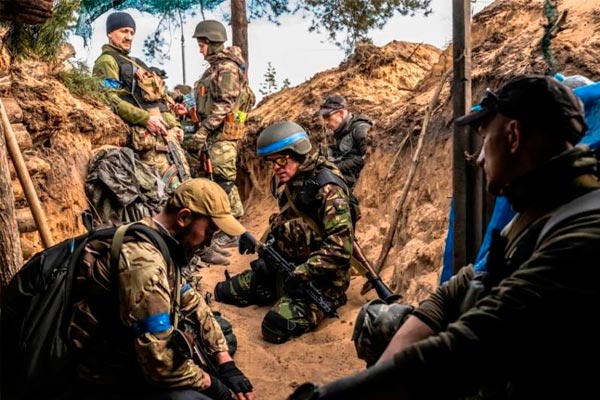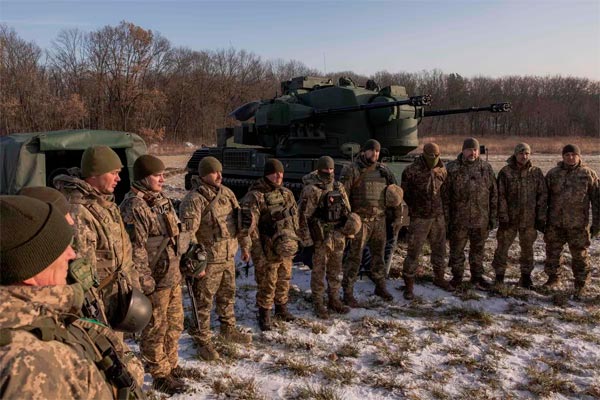In a few weeks it will be two years since the start of the war in Ukraine. In this time US imperialism and the European Union - dragged behind Washington in a display of its historical decadence - have provided the far-right Ukrainian government with military and financial aid worth more than $200 billion, the equivalent of Ukraine's GDP.
At the same time, they launched sanctions - so far twelve rounds since February 2022 - with the promise that they would sink the Russian economy. But two years later, and despite this massive support, the sanctions and all the Western propaganda, US imperialism is losing the war, and is now facing unforeseeable consequences.
Military failure
The Putin regime, reactionary, chauvinist and furiously anti-communist, and solidly aligned with the imperialist bloc led by China, has succeeded in taking the war into its own hands, turning it into a conflict of resistance and attrition in which it has every material, human, economic and political advantage.
The Ukrainian offensive launched last summer has ended in a resounding failure. Zelensky's troops are retreating from the few positions where they advanced a few kilometres or a few hundred metres, while Russia has taken Marinka or continues to close the encirclement of Avdiidka.
What has happened on the front in recent months has exposed Zelenski and his masters in the West. Until now, war propaganda insisted on the modernisation of the Ukrainian army and its determination to leave behind outdated Soviet doctrine in favour of NATO's "superior tactics".

But in the Ukrainian counteroffensive it was precisely Washington's military plan which hit the defensive wall built by Russia. Ukrainian commander-in-chief Zaluzhni summed it up in one devastating sentence to the Pentagon military: "You don't understand the nature of this conflict. This is not counter-insurgency. This is Kursk", referring to the greatest tank battle in history, between Nazi Germany and the USSR during World War II.
This phrase is not only a criticism of the plans outlined by Washington for that ill-fated offensive, it points directly to the fact that the decisive elements in an imperialist conflict of this kind are the level of development of the productive forces and the internal cohesion of the contenders. And in this equation we are not just talking about Ukraine and Russia, but about the state of the US economy, the EU and China, and their political stability and "social fats" to sustain the war.
Russia is neither isolated nor on the edge of collapse.
First, it must be said that Putin's regime has not only sustained Russia's economy, but successfully transformed it into a war economy. Obviously, China's backing has been a decisive element in overcoming the difficulties.
The mainstream US media and pillars of NATO propaganda, such as the reactionary Institute for the Study of War, have acknowledged that Russia has restocked its missile stockpile considerably faster than the West had anticipated and is already producing more than it did before February 2022. The Economist devoted an article to explaining Russia's superiority over Ukraine in both electronic warfare and the use of drones.
By contrast, the West has emptied its arsenals and has shown itself incapable, economically and politically, not only of supplying ammunition and weapons at the pace required for such a war, but also of replenishing its stockpiles. A European Council on Foreign Relations coordinator summed it up: "Russia's defence industry produces tanks, artillery and ammunition 24 hours a day, 7 days a week, 365 days a year. And this is something that NATO has not yet achieved".
Similarly, some figures on the Russian economy published in recent weeks demolish Western propaganda about the effects of sanctions. According to a November report by JP Morgan, the Russian economy will grow by more than 3% this year and 1.8% in 2024, compared to the 0.6% and 1.3% expected in the EU. A country at war is growing almost three times more than Germany and twice the growth of France!
As the bourgeois press acknowledges, Russia continues to trade with the West, selling oil and gas at record levels, and importing directly or through third parties, and has also substantially increased its trade with China, India or the UAE[1], which has been a boost to both internal demand and wages.
The West has emptied its arsenals and has shown itself incapable, economically and politically, not only of supplying ammunition and weapons at the pace required for such a war, but also of restocking its arsenals.
Unemployment is at an all-time low of 3% and wages are rising at a rate of over 11%, while inflation stands at 5.2%. This means that the wages of millions of workers in Russia have risen by more than 6%, clearly much higher than in the West.
Far from the years of recession and economic stagnation predicted by Western propaganda, this is the material basis for Putin's 80% approval rating in the polls.
Demoralisation in Zelensky's government and outright pessimism among his backers
On the Western side there is not a single piece of data that inspires confidence.
The situation in Washington is reaching a breaking point, with the Republicans rejecting a new 60 billion aid package at a time when US public support for continuing to send arms to Ukraine is at an all-time low. Moreover, we are entering an election year and the Biden Administration, bogged down in its support for Zionist genocide in Gaza, is changing its narrative: from supporting Ukraine "whatever it takes", it is now "we will support to the extent that we can".
As for the EU, divisions are deepening in a context of economic paralysis: Hungary's role as Putin's ally has been compounded by the victory of the pro-Russian candidate in Slovakia, clashes between Poland and Ukraine are growing, and the victory of the far right in the Dutch elections adds to the uncertainty.
But the worst is the situation in Germany, with the economy at a standstill and a government led by the SPD that is floundering and has paved the way for the advance of the far-right AfD. The latter has also resorted to all its populist and nationalist demagogy to denounce Germany's servility towards Washington and call for the restoration of relations with Russia.
This is what has prevented the EU from approving a new 50 billion aid package, key to paying the salaries of two million Ukrainian public sector workers in the first place. True, Brussels has given the green light for Ukraine's EU membership, but this is little more than candy for Zelenski, as it will involve a long and tortuous process for which there are no guarantees and which follows NATO's slamming of the door at last summer's Vilnius summit.
As a backdrop to this bleak picture, the morale among the troops and the population in Ukraine is at an all-time low.
Time magazine - the same magazine that named Zelenski man of the year in 2022 - published a report in October describing Ukraine in a Dantesque way. A senior official describes corruption -off the record- with the phrase 'they're stealing like there's no tomorrow', and Zelenski is portrayed as a leader who cannot be contradicted, surrounded by a clique and whose allies are shutting him out.

The elements of decay in the Ukrainian regime are manifesting themselves in an increasingly raw manner. Clashes between Zelenski and commander-in-chief Zaluzhni are being aired in public, amid polls that give Zelenski 32 per cent support versus a 70 per cent support for Zaluzhni.
Within this rotten state apparatus, a full-blown civil war is being waged with bombings and poisonings. If the situation continues to deteriorate for Ukraine we cannot rule out the possibility of a coup d'état, something that different media are already pointing to, giving Zaluzhni the decision to set the conditions for a negotiation with Russia.
The latest to add his voice to the criticism of Zelensky was the mayor of Kiev, accusing him of being "authoritarian and of not having prepared the country for war". Faced with increasingly dark perspectives, it seems that the rats are starting to jump off the ship.
Since the summer, calls for negotiations have been growing in the West. The point is that in this momentous battle to maintain the US influence in Europe, which is part of a wider battle for world supremacy between the US and China, Washington has no choice: either accept defeat or up the ante, escalating its involvement in the war.
But as every crisis that opens up makes clear, US imperialism no longer has the capacity to impose its order: can Washington embark directly on a war, mobilising tens or hundreds of thousands of troops, after the disaster in Afghanistan, the genocide in Gaza and the endless bloodshed in Ukraine? What would happen inside the US, how would the working class and the youth react?
The way out that is beginning to make headway in important sectors of the US ruling class is to legalise Russian control of south-east Ukraine - 20% of the country - and a freezing of the conflict, offering a solution similar to the situation in the two Koreas, or that provided at the time by the Minsk agreements.
In any case one thing seems certain: a defeat of US imperialism in the war in Ukraine, a defeat which in many aspects is already evident, will have tremendous consequences and will encourage a new change of quality in the correlation of forces in both imperialist blocks.
[1] Trade between Russia and China reached $218 billion from January to November 2023, when the target in 2022 was to reach $200 billion in 2024. Russia has increased its trade with the United Arab Emirates by 67.7 per cent in 2022.





















































